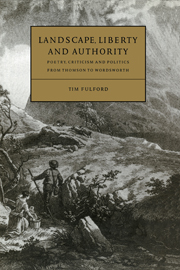Book contents
- Frontmatter
- Contents
- Acknowledgements
- List of abbreviations
- Introduction
- 1 Thomson and Cowper: the ‘stubborn Country tam'd’?
- 2 Johnson: the usurpations of virility
- 3 Unreliable authorities? Squires, tourists and the picturesque
- 4 Wordsworth: the politics of landscape
- 5 Coleridge: fields of liberty
- Index
- CAMBRIDGE STUDIES IN EIGHTEENTH-CENTURY ENGLISH LITERATURE AND THOUGHT
3 - Unreliable authorities? Squires, tourists and the picturesque
Published online by Cambridge University Press: 14 September 2009
- Frontmatter
- Contents
- Acknowledgements
- List of abbreviations
- Introduction
- 1 Thomson and Cowper: the ‘stubborn Country tam'd’?
- 2 Johnson: the usurpations of virility
- 3 Unreliable authorities? Squires, tourists and the picturesque
- 4 Wordsworth: the politics of landscape
- 5 Coleridge: fields of liberty
- Index
- CAMBRIDGE STUDIES IN EIGHTEENTH-CENTURY ENGLISH LITERATURE AND THOUGHT
Summary
Thomson, in poetry, and Johnson, in criticism, had in related ways used landscape-description to recognize and also to control threatening disorder. When aesthetic, moral or political beliefs based on the legitimacy of property were challenged, these writers temporarily restored order by figuring the challenging force – women, another writer, an oral rural culture, an exploited social class – as objects in a scene constructed and organized, in the names of providential order, by their writing. This strategy both reaffirmed the power of written over oral authority and aligned it with the power of property holders. The writer owned his scene just as the landowner (for whom he was, in practice, often writing) owned his estate. And since Thomson's poetic scenes not only contained an apparently natural disorder but sought to reflect in verse the landscaped estates of the nobility, they seemed to confirm the legitimacy of the landowners' taste. The possession of taste for a cultivated order designed into and then read out of the owned landscape came to be a sign of one's legitimacy as a gentleman landowner. This taste was threatened in practice by its politicization in response to threats to its independence and assumed legitimacy from above and below, from ministry and peasantry.
Johnson had both supported legitimacy in the aesthetic and political realms and attacked it.
- Type
- Chapter
- Information
- Landscape, Liberty and AuthorityPoetry, Criticism and Politics from Thomson to Wordsworth, pp. 116 - 156Publisher: Cambridge University PressPrint publication year: 1996

